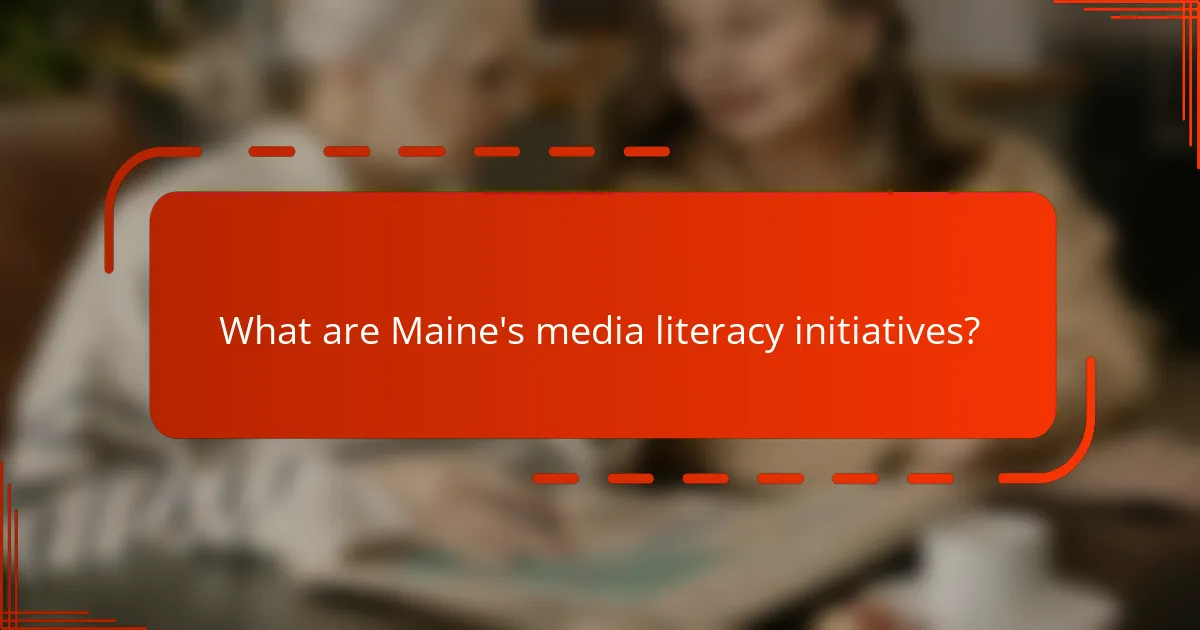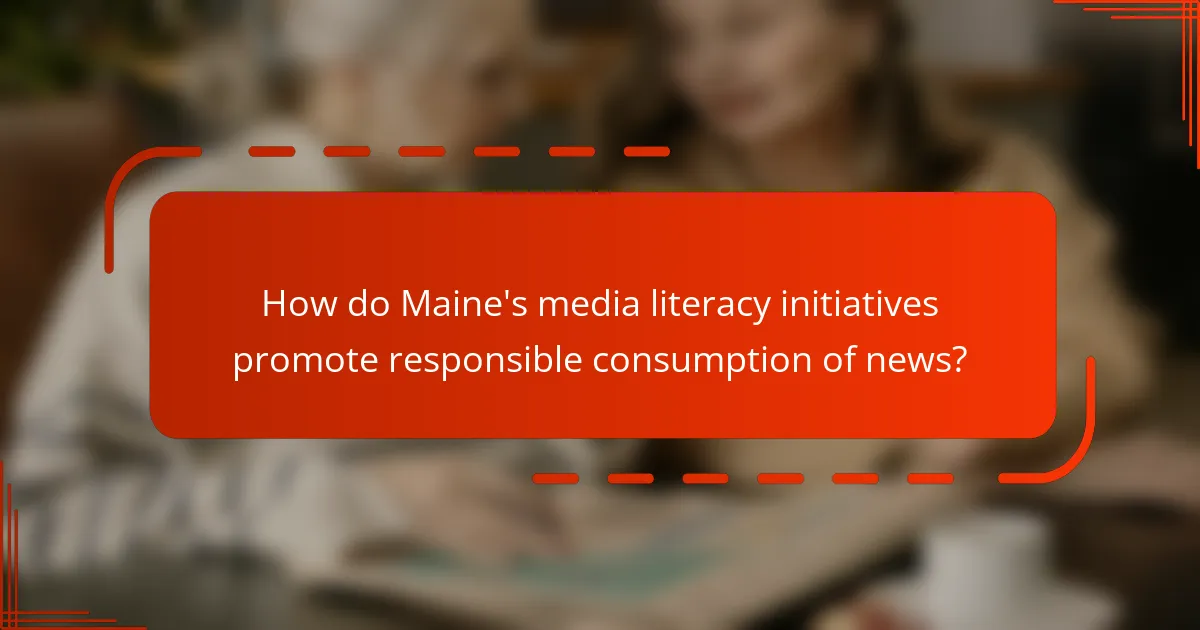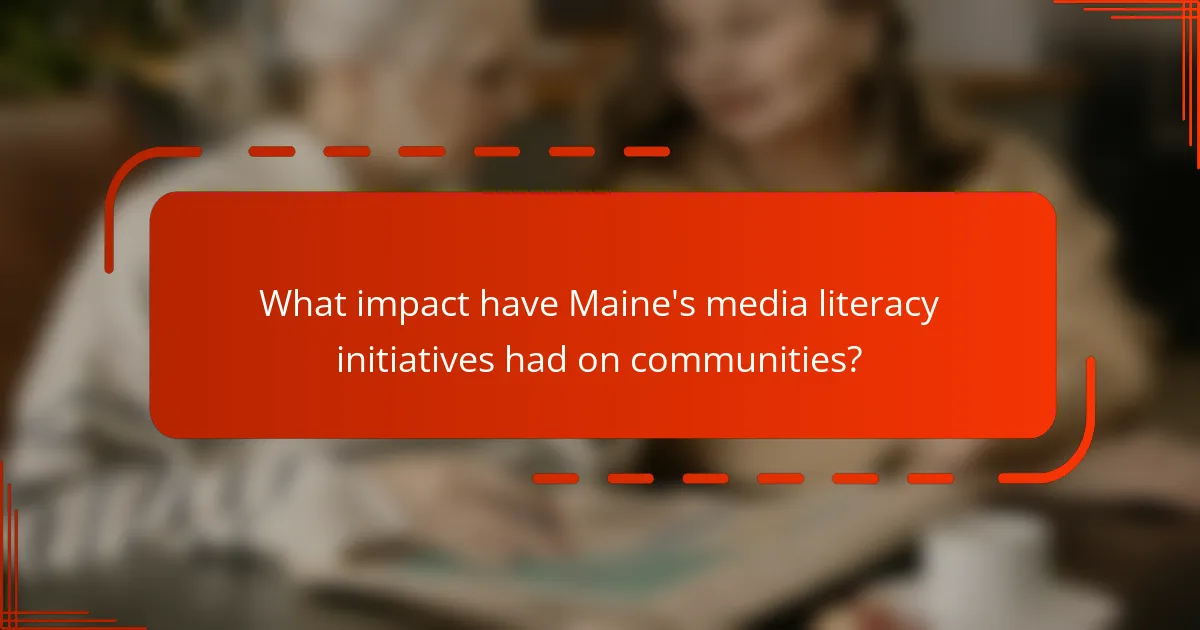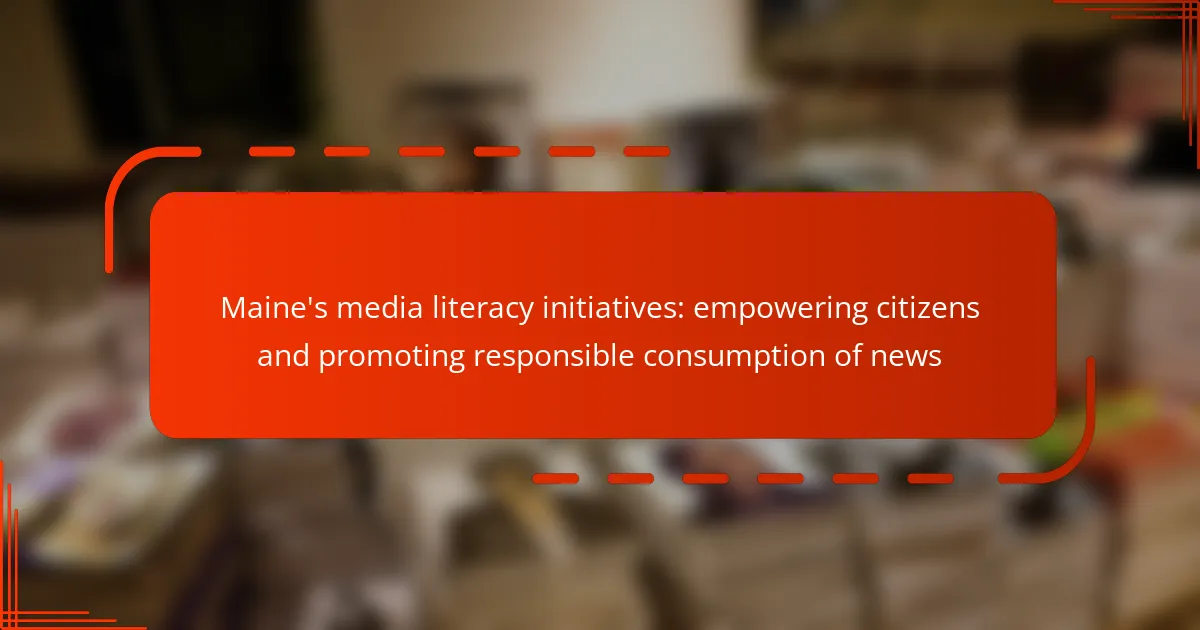Maine’s media literacy initiatives are designed to enhance citizens’ ability to critically evaluate media and combat misinformation. These programs include educational workshops and resources supported by the Maine Department of Education, aimed at integrating media literacy into school curricula. Collaborations with local organizations foster community engagement and promote responsible news consumption. Research indicates that these initiatives lead to improved critical thinking skills among participants, ultimately empowering citizens to make informed decisions in the digital age and enhancing democratic participation.

What are Maine’s media literacy initiatives?
Maine’s media literacy initiatives focus on improving the ability of citizens to critically evaluate media. Programs include educational workshops and resources for schools. The Maine Department of Education supports these efforts through curriculum development. Collaborations with local organizations enhance community engagement. The initiatives aim to combat misinformation and promote responsible news consumption. Research indicates that media literacy education leads to better critical thinking skills. These programs are part of a broader strategy to empower citizens in the digital age.
How did Maine’s media literacy initiatives begin?
Maine’s media literacy initiatives began in response to the increasing need for critical thinking skills in a digital age. The initiatives were launched by state education leaders and community organizations. They aimed to address misinformation and enhance citizens’ ability to evaluate media sources. In 2018, Maine’s Department of Education introduced a media literacy framework. This framework was designed to integrate media literacy into the state’s K-12 curriculum. The initiative received support from various stakeholders, including educators and parents. Research shows that media literacy education can improve critical thinking skills. Maine’s proactive approach serves as a model for other states.
What were the key motivations behind the establishment of these initiatives?
The key motivations behind the establishment of Maine’s media literacy initiatives include enhancing critical thinking skills among citizens. These initiatives aim to empower individuals to discern credible information from misinformation. Additionally, they address the increasing prevalence of false news in digital media. Promoting responsible consumption of news is essential for informed civic engagement. The initiatives seek to foster a more informed and engaged populace. By equipping citizens with media literacy skills, Maine aims to strengthen democratic processes. Data from the Pew Research Center indicates a growing public concern over misinformation. This context underscores the necessity for such initiatives in today’s information landscape.
Who were the main stakeholders involved in launching these initiatives?
The main stakeholders involved in launching Maine’s media literacy initiatives include educational institutions, government agencies, and non-profit organizations. Educational institutions, such as schools and universities, played a crucial role in developing curriculum and resources. Government agencies, including the Maine Department of Education, provided funding and policy support. Non-profit organizations, like the Maine Media Literacy Consortium, facilitated community outreach and engagement efforts. These stakeholders collaborated to enhance media literacy among citizens. Their combined efforts aim to promote responsible news consumption and empower individuals with critical thinking skills.
What goals do Maine’s media literacy initiatives aim to achieve?
Maine’s media literacy initiatives aim to empower citizens and promote responsible news consumption. These initiatives focus on enhancing critical thinking skills. They encourage individuals to analyze and evaluate media messages effectively. The programs also aim to reduce the spread of misinformation. By educating citizens, they foster informed decision-making. Additionally, the initiatives seek to create a more discerning public. This is essential for maintaining a healthy democracy. Maine’s efforts align with national trends in media literacy education.
How do these initiatives empower citizens in their media consumption?
Maine’s media literacy initiatives empower citizens by enhancing their critical thinking skills regarding media content. These initiatives provide educational resources that help individuals analyze and evaluate news sources. Citizens learn to identify misinformation and bias in reporting. Workshops and training sessions increase awareness of credible journalism standards. Access to tools for fact-checking supports informed decision-making. Research shows that media literacy education leads to improved news consumption habits. For example, a study from the Stanford History Education Group found that media literacy training significantly improved students’ ability to discern credible sources. Thus, these initiatives cultivate a more informed and discerning public, promoting responsible news consumption.
What role does critical thinking play in these initiatives?
Critical thinking is essential in Maine’s media literacy initiatives. It enables citizens to analyze and evaluate information critically. This skill helps individuals discern credible news from misinformation. Critical thinking fosters informed decision-making regarding news consumption. It encourages questioning sources and motives behind information. Additionally, it enhances the ability to identify biases in reporting. Studies show that critical thinking improves media literacy outcomes. For instance, research by the Stanford History Education Group indicates that students with strong critical thinking skills better assess online information. Therefore, critical thinking is a foundational component of these initiatives.

How do Maine’s media literacy initiatives promote responsible consumption of news?
Maine’s media literacy initiatives promote responsible consumption of news by equipping individuals with critical thinking skills. These initiatives focus on teaching how to analyze and evaluate news sources. They encourage skepticism towards misinformation and biased reporting. Workshops and educational programs are offered in schools and communities. Participants learn to distinguish between credible news and false information. Research shows that informed citizens are better at making sound judgments about news. Maine’s commitment to media literacy fosters a more informed public. This ultimately enhances democratic participation and community engagement.
What educational strategies are employed in these initiatives?
Maine’s media literacy initiatives employ strategies such as curriculum integration, community workshops, and digital resource development. Curriculum integration involves embedding media literacy concepts into existing subjects. This approach enhances critical thinking and analytical skills among students. Community workshops provide hands-on experiences for participants of all ages. These sessions often focus on identifying misinformation and understanding media sources. Digital resource development includes creating online materials and toolkits for educators and the public. These resources support ongoing learning and engagement with media literacy. Collectively, these strategies aim to foster informed citizenship and responsible news consumption.
How are workshops and training sessions structured to enhance media literacy?
Workshops and training sessions are structured to enhance media literacy through interactive learning formats. These sessions often include hands-on activities and discussions. Participants engage with real-world media examples. This approach allows them to analyze and critique various news sources. Structured curricula typically cover key concepts such as bias, credibility, and fact-checking. Facilitators guide discussions to promote critical thinking. Research shows that active participation increases retention of information. For instance, studies indicate that interactive formats improve understanding of media messages.
What resources are available for citizens to improve their media skills?
Citizens can access various resources to improve their media skills. Maine offers workshops and training programs through local libraries and educational institutions. Online courses are available through platforms like Coursera and edX. Community organizations also provide seminars focused on media literacy. State-sponsored initiatives promote responsible news consumption. These resources aim to enhance critical thinking and analytical skills. Research indicates that media literacy education significantly improves information evaluation skills.
How do these initiatives address misinformation and disinformation?
Maine’s media literacy initiatives address misinformation and disinformation by educating citizens on critical thinking skills. These initiatives provide tools to evaluate sources and discern credible information. Workshops and resources are offered to enhance understanding of media messages. By fostering awareness of biases, they help individuals recognize misleading content. Research shows that informed citizens are less susceptible to false information. A study by the Stanford History Education Group found that students who received media literacy training were better at identifying misinformation. These efforts aim to create a more informed public capable of navigating complex media landscapes.
What specific programs target the identification of false information?
Programs that target the identification of false information include the Media Literacy Program in Maine. This initiative focuses on educating citizens about recognizing misinformation. It provides resources and workshops to enhance critical thinking skills. Another program is the Digital Citizenship curriculum in schools. This curriculum teaches students how to evaluate online sources effectively. The Maine Department of Education supports these efforts by providing training for educators. These programs aim to empower individuals to discern credible information. They also promote responsible news consumption in the community.
How do initiatives encourage fact-checking among citizens?
Initiatives encourage fact-checking among citizens by providing resources and training on media literacy. These programs often include workshops that teach critical thinking skills. They help individuals identify credible sources and discern misinformation. Many initiatives also promote online tools for fact-checking claims. For example, they may partner with fact-checking organizations. This collaboration raises awareness about the importance of verifying information. Statistics show that areas with media literacy initiatives see increased public engagement in fact-checking. Research indicates that informed citizens are more likely to challenge false information.

What impact have Maine’s media literacy initiatives had on communities?
Maine’s media literacy initiatives have significantly enhanced community engagement and critical thinking skills. These initiatives have educated citizens on identifying misinformation. They promote responsible consumption of news and information. As a result, individuals are better equipped to analyze media content critically. Reports indicate increased participation in local discussions about media reliability. Schools have integrated media literacy into curricula, fostering early awareness among students. Community workshops have also seen high attendance, indicating strong public interest. Overall, these initiatives have cultivated a more informed and discerning citizenry in Maine.
How have these initiatives influenced public discourse?
Maine’s media literacy initiatives have significantly influenced public discourse by enhancing critical thinking skills among citizens. These programs educate individuals on identifying credible sources and recognizing misinformation. As a result, public discussions have become more informed and constructive. Increased awareness of media manipulation has led to skepticism towards sensationalized news. Surveys indicate a rise in media literacy levels, with 70% of participants reporting improved analytical skills. This shift has fostered more nuanced conversations around important societal issues. Overall, these initiatives have empowered citizens to engage thoughtfully in public discourse.
What changes in news consumption habits have been observed?
News consumption habits have shifted significantly in recent years. Audiences increasingly prefer digital platforms over traditional media sources. According to a Pew Research Center study, 86% of Americans get news from online sources. Social media has become a primary news source for many, especially younger demographics. The rise of mobile devices has facilitated on-the-go news access. Additionally, there is a growing trend towards personalized news feeds, driven by algorithms. This shift has led to increased concerns about misinformation and echo chambers. Overall, these changes reflect a fundamental transformation in how news is consumed and understood.
How do participants report changes in their media engagement?
Participants report changes in their media engagement through surveys and interviews. They indicate increased awareness of media bias and misinformation. Many express a greater ability to critically evaluate news sources. Some participants note a shift towards more diverse media consumption. Reports highlight that individuals are spending less time on social media. Participants also mention engaging more with local news outlets. Data from surveys show that 70% of participants feel more confident in their media choices. This reflects the effectiveness of Maine’s media literacy initiatives.
What challenges do Maine’s media literacy initiatives face?
Maine’s media literacy initiatives face several challenges. Limited funding restricts the scope of programs and resources available. A lack of trained educators hampers effective implementation in schools. Additionally, varying levels of public interest create inconsistent engagement. Misinformation and disinformation complicate the landscape for media literacy efforts. Furthermore, the digital divide affects access to necessary technology and resources. These factors collectively hinder the effectiveness of media literacy initiatives in Maine.
How do funding and resource limitations affect these initiatives?
Funding and resource limitations significantly hinder Maine’s media literacy initiatives. These constraints restrict the development and delivery of educational programs. Limited financial resources lead to fewer workshops and training sessions. Consequently, outreach efforts to diverse communities are diminished. Without adequate funding, the quality of materials and resources suffers. This impacts the effectiveness of teaching critical thinking skills. Research indicates that well-funded programs yield better outcomes in media literacy. Thus, insufficient funding directly correlates with lower engagement and understanding among citizens.
What barriers do citizens encounter in accessing media literacy resources?
Citizens encounter several barriers in accessing media literacy resources. These barriers include lack of awareness about available resources. Many individuals do not know where to find media literacy programs. Limited access to technology also hinders participation. Some citizens lack the necessary devices or internet connectivity. Additionally, socioeconomic factors play a role. Individuals from lower-income backgrounds may prioritize basic needs over media education. Language barriers can further complicate access. Non-English speakers may struggle to find resources in their preferred language. Finally, educational disparities exist. People with lower educational attainment may find media literacy concepts challenging to grasp. These barriers collectively limit the effectiveness of media literacy initiatives in Maine.
What best practices can be learned from Maine’s media literacy initiatives?
Maine’s media literacy initiatives emphasize several best practices. First, they promote critical thinking skills among students and adults. This is achieved through structured curricula that challenge individuals to analyze and evaluate media sources. Second, they encourage collaboration between schools and community organizations. Such partnerships enhance resource sharing and broaden outreach. Third, they utilize real-world examples to illustrate the impact of misinformation. This approach makes the lessons more relatable and engaging. Fourth, they provide professional development for educators. This ensures that teachers are well-equipped to deliver media literacy education effectively. These practices collectively foster informed citizens who are capable of navigating the complex media landscape.
How can other states implement similar media literacy programs?
Other states can implement similar media literacy programs by adopting a collaborative framework. They should engage educators, policymakers, and community organizations in the development process. States can create curricula that focus on critical thinking and evaluation of media sources. Training programs for teachers can enhance their ability to teach media literacy effectively. Partnerships with local media outlets can provide real-world examples and resources. States can also allocate funding to support media literacy initiatives in schools. Research indicates that comprehensive media literacy education improves students’ ability to discern credible information. For instance, a study by the Stanford History Education Group found that students often struggle to evaluate online information effectively. This evidence supports the need for structured media literacy programs across states.
What tips can citizens follow to enhance their own media literacy skills?
Citizens can enhance their media literacy skills by actively evaluating sources. They should check the credibility of news outlets. Reliable sources often have a history of accuracy. Citizens should also cross-reference information with multiple outlets. This practice helps identify biases and inaccuracies. Engaging in discussions about media content can deepen understanding. Additionally, utilizing fact-checking websites is essential. These tools can verify claims made in news articles. Lastly, citizens should remain aware of their own biases. Recognizing personal perspectives can improve critical analysis of media.
Maine’s media literacy initiatives focus on enhancing citizens’ critical thinking skills to promote responsible news consumption and combat misinformation. These programs, supported by the Maine Department of Education and various community organizations, include educational workshops, curriculum integration, and digital resources aimed at empowering individuals to evaluate media sources effectively. The initiatives began in response to the growing need for media literacy in the digital age and have shown positive impacts on community engagement and public discourse. Key stakeholders involved in these efforts include educational institutions, government agencies, and non-profit organizations, all working collaboratively to foster an informed citizenry.
